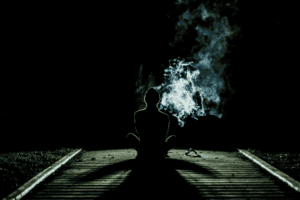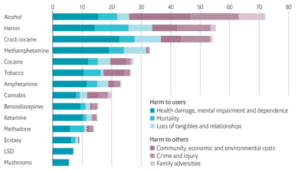History of Crack
Crack cocaine, commonly referred to as “crack”, is a byproduct of the drug cocaine. Derived from Coca leaves and chemically developed in 1859, cocaine quickly became an addictive stimulant, and one of the most popular throughout the twentieth century. In the early 1980s, internationally turmoil diverted the attention of the United States, allowing drug smuggling into the country to reach an all-time high. With a surplus of cocaine at their disposal, cartels and trafficking organizations formulated an idea to increase the quantity even more. By diluting cocaine with water and baking soda, the mixture would eventually harden when cooked. The result was a crystalized cocaine-based rock which would come to be known as “crack”. By the mid 1980s, crack had infiltrated all major U.S. cities resulting in widespread use among low-income and minority communities. This would soon become known as the “crack epidemic”. Considered the most addictive form of cocaine, crack devastated families and neighborhoods and continues to do so today. According to the US National Survey on Drug Use and Health, 8.6 million Americans aged 12 and older reported having used crack in 2006 alone.

The Crack High
Crack is oftentimes smoked but can also be snorted or injected. The use of crack results in an intense, short-term high in which the user experiences:
Euphoria
Extreme confidence
Loss of appetite
Insomnia
Alertness
Increased energy
Paranoia
Increased heart rate
Irritability
Side Effects of Crack Abuse
Long-term crack abuse can cause lasting effects and irreversible damage. Such side effects include:
Birth defects
Respiratory arrest
Psychosis
Delusional parasitosis (feeling of bugs under skin)
Cardiac arrest
“Crack lung”
Seizures
Amphetamine poisoning
Death
Crack Use in the United States
According to the 2015 US National Survey on Drug Use and Health, 9,035,000 people had reported using crack at least once in their lifetime, 833,000 people had used crack in the past year, and 394,000 people had used crack in the past month. The graph below ranks crack as third among the most abused and addictive drugs in the United States.

Crack Addiction Treatment
Crack is highly addictive and life-threatening when abused; therefore, it is extremely important to seek help immediately if you or a loved one is struggling with this addiction. At Asheville Recovery Center, treatment specialists utilize a 12-step program and practice holistic rehabilitation.
Services at the center include:
Partial Hospitalization Program – At Asheville Recovery Center we offer a partial hospitalization program for clients who need post-residential treatment as well as for clients who need primary treatment but are unable to enroll in inpatient programs. Our PHP track offers a variety of therapeutic services and benefits to individuals in early recovery from substance addiction. Our day program is full-time, offering all of the clinical hours provided in residential treatment (from 9 am to 5 pm) with the benefit of allowing clients to return home to a structured sober living environment at night. This gives individuals the opportunity to build a community of peers and practice life skills, such as cooking, cleaning, and self-care, while still participating in immersive and intensive clinical addiction and trauma treatment.
Outpatient Rehabilitation – During intensive outpatient treatment, clients live at home or in a sober living residence which can help keep them accountable for their recovery commitment. Our staff coordinates with local, reputable sober living homes to ensure that our clients are living in a safe place and that their needs are being met, even when they are not at clinical sessions. During this time, clients are also encouraged to become involved in local twelve-step fellowships, to find sponsors, and to begin working the steps of recovery through participation in these groups. IOP is a place where clients can process their experiences in twelve-step fellowships and support one another in those individual journeys.
Addiction is difficult to overcome alone. If you feel that you or a loved one is struggling with crack abuse, our specialists are on standby and ready to help. Call (828)383-0784 and speak with an addiction expert today.






